Urbanism / Zürich
Better together
Could a co-operative housing estate in Switzerland be the model for a new way of living that can help city dwellers escape sky-high rents and a lack of interaction? We head to Mehr als Wohnen to find out.
Not many housing estates have an onsite violin restorer. Or a book publisher, a recording studio, two award-winning restaurants, a stylish guesthouse and a rooftop sauna. There’s even a classical-music salon run by an opera singer; on the evening we drop by, a cellist and pianist are performing Brahms sonatas by candlelight. But not many housing estates are like Mehr als Wohnen – literally, “more than living” – a co-operative that opened on the site of a former concrete factory in Zürich’s Hunziker Areal neighbourhood in 2014. We visited Mehr als Wohnen three years ago to see how the first wave of tenants were settling in; many are still here.
City-planner Jordi Riegg, 44, was an early arrival. He and his girlfriend initially lived in a “cluster apartment”: sprawling arrangements of eight bedrooms linked to capacious common areas. They have since moved to a more orthodox 80 sq m apartment with a kitchen and living area, two bedrooms and a bathroom. It is spartan but smart, with wooden-laminate floors and exposed-concrete ceilings. The couple pay rent of chf1,800 (€1,600) per month; good value by local standards. “But it’s not just that,” says Riegg. “I still really like it here. It feels like a village but even more concentrated. It’s almost like a mini state.”
Riegg shows us around the 13 handsome buildings of Mehr als Wohnen, explaining its quirks and governance as he goes. Residents gather for a general assembly twice a year but are also kept up to date via a monthly email newsletter and a subscriber-only intranet. There are dozens of residents groups – which can be assembled when five or more residents rally behind one cause – covering a host of issues and interests. These groups can apply for funding from a kitty to which everyone contributes; the money is then disbursed by a panel of seven elected representatives.
Riegg is among those who pays for a share of the produce from nearby allotments; others make use of workshops. Residents leave unwanted possessions on a table in a hallway for others to claim; on offer today are saucepans, a blue woollen scarf, a bicycle pump, recipe books and a belly-dancing-instruction dvd, which is gone by the following day. Responsibility for encouraging participation in all that Mehr als Wohnen has to offer falls to Anna Haller, 36, one of 14 administrators. She estimates that 20 per cent of the 1,250 residents play an active part in proceedings, a proportion that she says compares favourably with other Swiss co-ops. Care is taken, she adds, to keep the population diverse, with the population of Zürich used as a template for deciding numbers according to gender, age, income, ethnicity and other metrics.
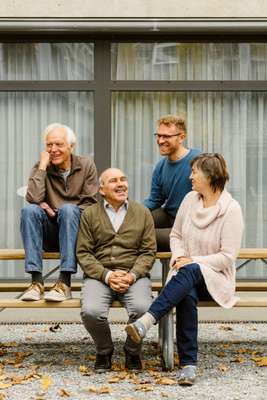
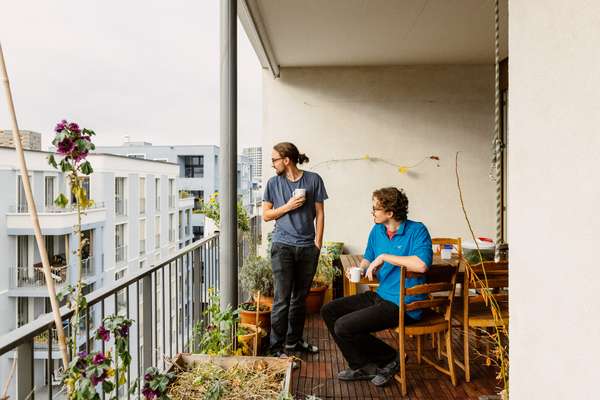
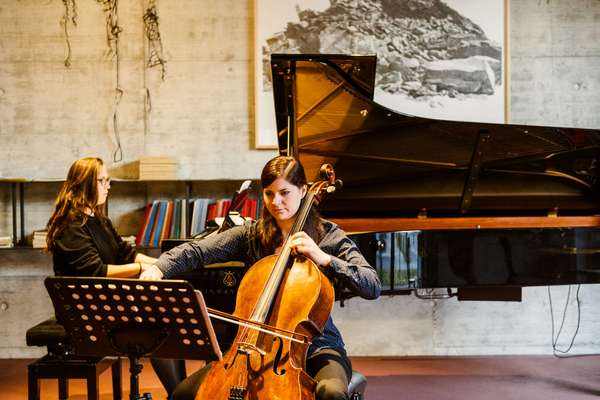
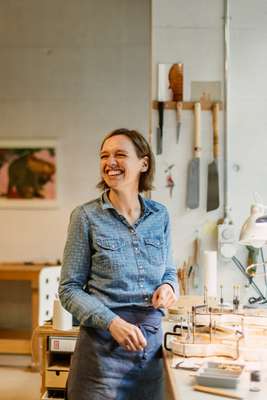
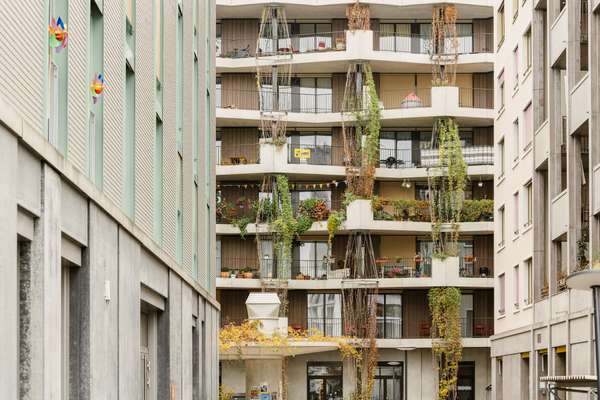
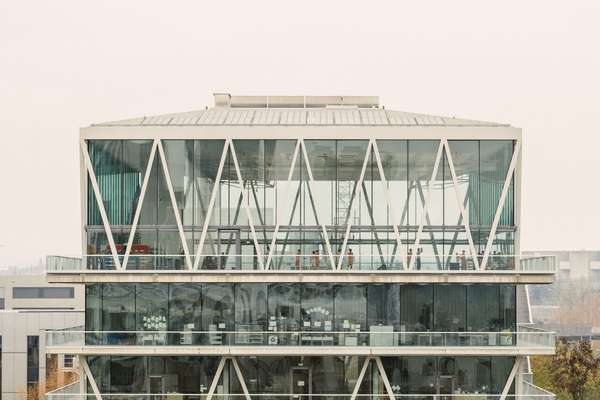
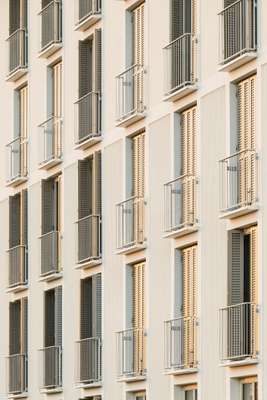
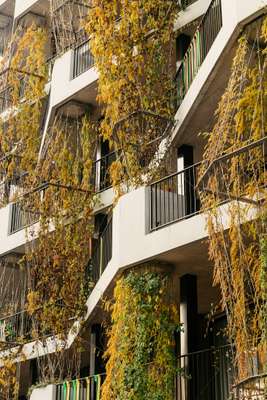
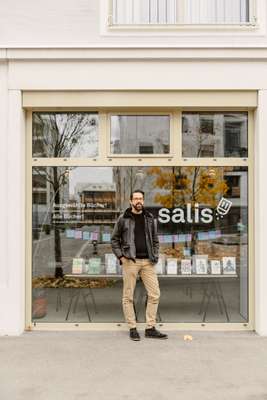
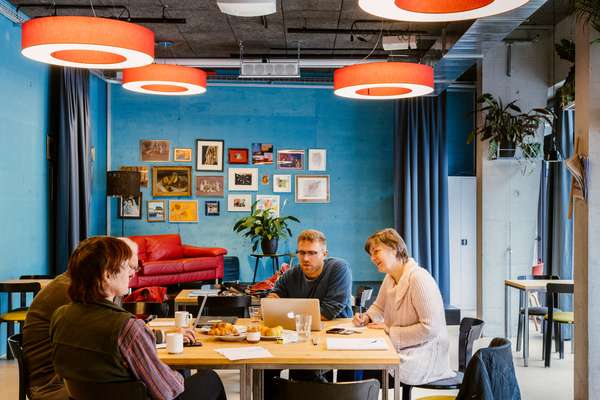
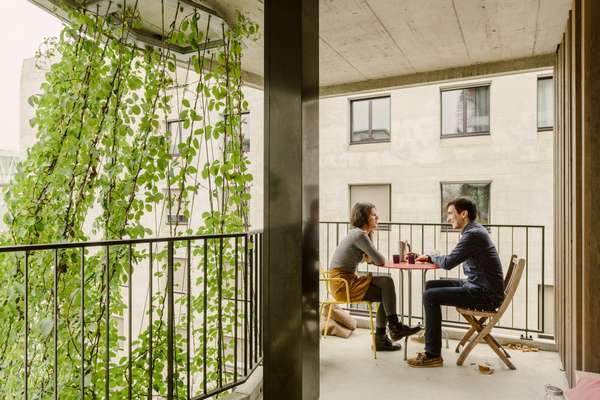
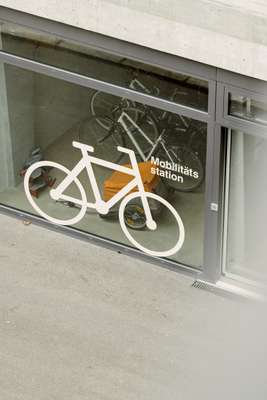
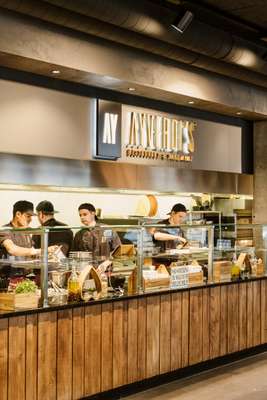
We meet Solomon Semhar in Treffpunkt (“meeting point”), a free space on the main square. Semhar, 37, and her two children are one of nine Eritrean-refugee families in Mehr als Wohnen. She still becomes tearful when recalling the harrowing story of the journey that she made here six years ago. Unsurprisingly, her present circumstances make her cheerier and she sincerely describes Mehr als Wohnen as “like a big family”. The Eritreans have a monthly gathering, she says, but everyone is invited for Eritrean coffee. “They know everything about Eritrea now.” To reciprocate, some of the Swiss residents taught the Eritreans how to ride bicycles.
“I was just looking for an office,” says André Gstettenhofer, 46, founder of publishing house Salis. “But I ended up moving here with my family so my world has suddenly become very small.” Gstettenhofer points to his apartment, which is across the square from the Salis bookshop-cum-headquarters. “It’s actually even better than I imagined,” he adds. “It’s not an academic ghetto or a bohemian ghetto. I’ve met all kinds of people here and made lots of friends.”
Though many urban dwellers flee their apartments when children arrive, Gstettenhofer says that Mehr als Wohnen is a great place to raise a family. There’s a feeling of communal responsibility, he says, and the well-appointed Leutschenbach primary school – the recipient of awards for Christian Kerez’s design – is next door. “In fact,” says Gstettenhofer, “I don’t know if I’d live here if I didn’t have children.”
Though the most appealing aspects of living at Mehr als Wohnen are doubtless the practicality and relative economy, a measure of missionary zeal is discernible among its residents. The truest believers dwell in the cluster apartments, for which residents pay up to chf8,500 (€7,500) collectively in rent per month, with adjustments made according to room size. The apartments have interior windows facing a central stairwell to encourage familiarity between neighbours, though some admit that it takes time to get used to being watched by passers-by while they are eating their breakfast.
Judith Ellens, 36, lives with 10 other adults and her young child. “I like the interaction with other people,” she says. “And, from a sustainability perspective, sharing a household budget makes a lot of sense. We can buy in bulk and take turns to cook.” Samuel Müller, 34, keeps beehives next to solar panels on the roof of the cluster apartment building and on the balcony outside the communal laundry. “I think I spoke to my neighbours more often in the first six months than I did in 10 years in Zürich,” he says.
Christoph Homberger, 56, spent decades travelling the world as an acclaimed tenor. The day after his final performance – in Madrid in September 2014 – he received a call from Andreas Hofer, Mehr als Wohnen’s head of research and innovation. Hofer offered Homberger a venue for the tenor’s long-dreamt-of musical and culinary venture. Hombi’s Salon now stages evening concerts from Thursday to Sunday, often involving a 60-year-old Steinway grand that Homberger describes as “one of the best pianos in Zürich”. Up to 40 punters pay chf100 (€88) each for a dinner cooked by Homberger, with wine included. If the restaurant isn’t full, tables are offered to Mehr als Wohnen residents at half price.
Still, there are often spaces available. Downtown Zürichers are deterred, says Homberger, by a perception that Mehr als Wohnen might as well be on the Moon (from the city centre, it’s barely 20 minutes by bus). “It is a perfect idea,” says Homberger. “But it is not perfect yet.” He brightens up considerably, however, discussing the “anarchy chorus”, his name for the singing sessions he holds for children of the community on Wednesday afternoons.
Homberger’s other concern about the development is that the residents here have too much to choose from – there are worse problems to have of course. A co-operative model such as the one on display at Mehr als Wohnen is an enticing solution to some of the problems faced by those struggling to pay rent in major cities.
We wind up our day at Mehr als Wohnen’s Bagel Boys café, which came second in the “on the move” category in 2018’s Best of Swiss Gastro awards. It was beaten to the prize by Ayverdi’s, a nearby kebab house run by three Kurdish-Swiss brothers. Nathalie Bartholemie, 36, who works at Bagel Boys, used to live in Mehr als Wohnen, though she now resides a short walk away. “It’s awesome,” she says of her former home but adds that it might be good for her son to spend some time outside the development. “People here have everything they need,” she says, laughing. “So they don’t leave.”


